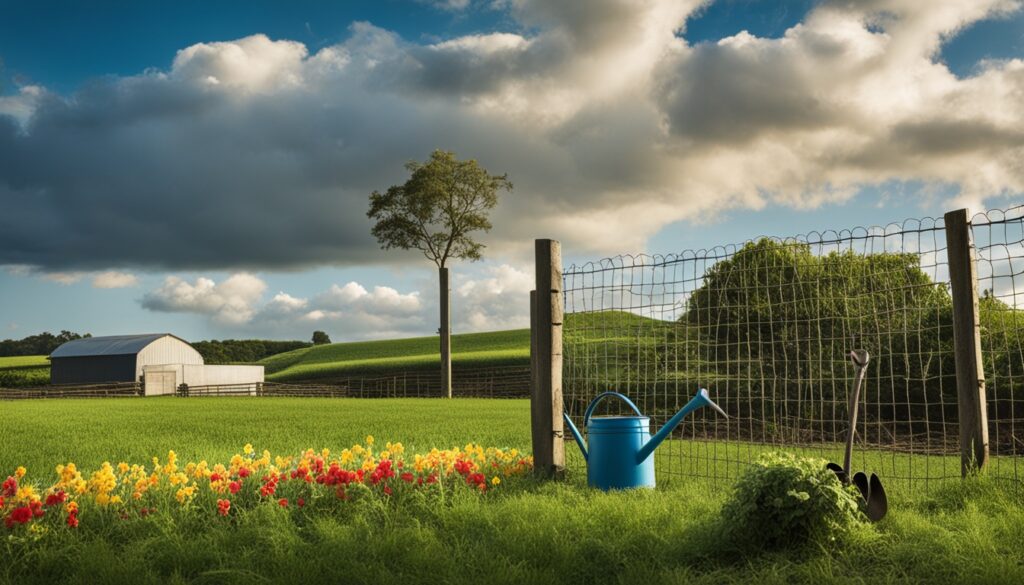Menu

In 2016, farmers and ranchers faced a male suicide rate of 43.2 per 100,000. This was higher than the 27.4 per 100,000 male rate across all jobs. Youth farmer mental health is a major concern due to economic worries, extreme weather, and feeling isolated.
Youth farmers deal with many challenges that can cause stress, anxiety, depression, and even thoughts of suicide. It’s crucial they can easily get help. They should know about services like the Farm Aid Hotline and the Suicide and Crisis Lifeline that are open all the time.
There is a need for a detailed guide on mental health support for farming families. Such a guide should list federal and state resources and helpful local programs. By addressing these issues, we can help create a happier and stronger farming community.
Young farmers face a unique set of challenges in agriculture. It’s essential to understand what causes their struggles. Economic, social, and environmental factors all play a big part in their mental well-being.
The economic climate, much like that of the 1980s Farm Crisis, is tough on young farmers. They deal with lower prices for their goods, more debt, and a lack of workers. Add to that ongoing trade battles.
This economic uncertainty doesn’t just hit their pockets. It also takes a toll on their mental health. Studies show that farmers have a higher risk of suicide. This highlights the urgent need for mental health support in farming communities.
Living far from urban centres often makes young farmers feel lonely. This makes mental health problems more common in rural areas. The feeling of being cut off from others can lead to serious issues like depression and loneliness.
Increasingly, farmers are turning to suicide, with rates going up sharply. This shows how important it is to offer them ways to connect and get help.
Weather and climate change are sources of ongoing stress for farmers. They face difficulties adapting to changing conditions quickly. This not only affects their crops but also their mental well-being.
Research also shows a link between climate change and farmer mental health. The unpredictability of the seasons and severe weather only make things worse. It’s crucial to find ways to support farmers through these challenges.
| Challenges | Impact on Mental Health |
|---|---|
| Economic Uncertainty | Increased stress, anxiety, higher suicide rates |
| Isolation in Rural Areas | Loneliness, depression, elevated prevalence of mental illness |
| Weather and Climate Change | Heightened stress, anxiety, mental health deterioration |
The farming community faces significant mental health problems. These issues can cause severe stress, anxiety, and depression. Unfortunately, there has been a rise in suicidal thoughts and actions. This makes it crucial to have strong mental health services and counselling for farmers.
Farmers are under a lot of pressure. They deal with risks to their finances and the unpredictability of the weather. Their hard work can also be physically demanding. Studies show that those in agriculture are more likely to suffer from mental health issues. This stress can lead to health problems such as heart disease. It can also cause panic attacks and lead to fears that affect daily life.
Depression is a major challenge for farmers. Research indicates that 60% of farm parents and young adults show symptoms of depression. Signs of depression include constant sadness and loss of interest in things they once enjoyed. These feelings can make it hard for farmers to do their job effectively. They need support to overcome their depression.

The suicide rate amongst farmers and ranchers is very high. It’s even higher than the rate for other working-age men. Challenges such as isolation and financial difficulties add to this. It is essential to prevent suicide in the farming community. This demands efforts to support mental health within farming.
| Indicator | General Population | Farming Community |
|---|---|---|
| Suicide Rate (per 100,000) | 27.4% | 43.2% |
| Prevalence of Anxiety Disorders | – | 45.1% Adolescents, 54.9% Adults |
| Prevalence of Depression | ~7% | 60% farm families |
Farmers need mental health services tailored to their unique challenges. Investing in these services is crucial. It’s the best way to help farmers and reduce the mental health crisis they face.
Mental health programs in farming are vital. Farmers face intense pressure due to economic woes and isolation. Tackling mental health in this community is crucial.
In 2016, farmers’ male suicide rate was 43.2 per 100,000, higher than other male workers. This comes from the 2020 Morbidity and Mortality Weekly Report. The numbers show how serious mental health issues are among farmers.
Research from 2017 shows mental illness is more common in rural areas. This makes it clear why farmers need special support for their well-being. The job’s strenuous nature can lead to depression, anxiety, and stress. These pressures also affect their physical health.
A key study from 2010 found suicide rates were higher among those in farming. This suggests a real need for strong mental health programs in farming. These initiatives can help reduce risks and support farmers in need.
Statistics from the UK reveal a high number of suicides in agriculture. For instance, 133 people died by suicide in 2019-20 in the UK agriculture sector. Almost all young farmers in Scotland see mental health as the biggest issue in farming. This shows how crucial support services are.
Bringing mental health into the open helps fight its stigma. It allows farmers to talk about their challenges and get support. This is vital because many farmers avoid seeking help for their mental health woes. With awareness, finding these issues early and helping get easier.
It’s crucial to spot the warning signs of mental health problems in farmers. Look out for changes in how they act and any physical symptoms. These changes can point to deeper mental health issues. The first signs are often in the way they behave or physical signs they show.

Changes in behaviour tell us a lot. Is someone more easily annoyed? Are they avoiding friends or changing their routines? These are key clues. In England and Wales, there were 107-111 suicides per 100,000 farmers. This shows how big the issue is. Some sheep farmers dealing with certain pesticides had brain and mental health problems. This suggests work dangers can hugely impact how someone acts.
Don’t ignore physical changes. Are they getting bad headaches or sleeping much? If they eat more or less, it could mean they’re deeply stressed or even depressed. In Iowa and Colorado, 37% of farmers showed signs of depression. It’s important to understand these signs well. Studies on suicide rates by job show farmers and farming workers face a greater risk. Early spotting of these signs can lead to timely help and mental health care.
| Region | Depressive Symptoms | Suicide Rate (per 100,000) |
|---|---|---|
| Iowa and Colorado | 37% | – |
| England and Wales | – | 107-111 |
| Georgia (2008-2015) | – | Suicides related to contextual stressors |
Farmers need to know these crucial signs of mental health issues. Finding these signs early can lower the risks of more serious problems like depression and suicide. Knowing and dealing with changes in how they act and their physical symptoms can make a big difference. It means the right help and support can get to them.
Young farmers often face tough mental health issues due to farming’s demanding nature. Thankfully, many resources are there to help them deal with these challenges. This support aims to keep them healthy and strong.
National hotlines are there to give immediate help. They include the Farm Aid Hotline and the Suicide and Crisis Lifeline, open all the time. They offer a listening ear and give farmers the support and help they need.
Local counselling services focus on tailored, long-term help. They provide face-to-face therapy and support during tough times. In Illinois, for instance, the FFRI offers a helpline and free counselling via the phone. This highlights the value of mental health help in rural areas.
Online support groups have become key, especially during lockdowns. They allow young farmers to share with others like them, offering advice and encouragement. These platforms reduce the loneliness that can come with rural living. They create a sense of community.
| Resource | Description | Availability |
|---|---|---|
| Farm Aid Hotline | Provides emotional and practical support for farmers | 24/7 |
| Suicide and Crisis Lifeline | Offers immediate assistance for mental health crises | 24/7 |
| FFRI Helpline | Specialises in ag-related stress support | Confidential, 24/7 |
| Telehealth Counselling | Free counselling sessions offered by FFRI | Up to six sessions |
All these supports are vital for young agricultural workers. They ensure that help is available whenever they need it. It’s all about ensuring they know they are not alone in their struggles.
Both on-farm and community-based mental health services are crucial. They help farmers face their unique challenges. These services ensure the farming community’s mental health needs are effectively addressed.

On-farm mental health support provides help directly to farmers. Mental health professionals offer this support. They understand the challenges of farm life well. They visit farms regularly and give advice. This help is very important.
Farmers have a higher risk of suicide than people in other jobs. Services like these are lifesaving. They offer immediate help and lower the stress of farming.
Community programmes bring farmers together for support. They offer workshops and talks tailored for farming life. Such activities help improve farmers’ mental health. They also deal with the unique stresses of farming.
In rural areas, fewer mental health experts are available. This makes community programmes even more important. They create strong support systems right where farmers live.
Combining on-farm and community support is very effective. It helps farmers cope better with stress and anxiety. It also encourages better living and farming practices. These services are key to healthier farm communities.
| Key Statistics | Data |
|---|---|
| Male suicide rate among farmers (2016) | 43.2 per 100,000 |
| Male suicide rate in other occupations (2016) | 27.4 per 100,000 |
| Prevalence of mental illness in rural areas (2017) | Higher than urban communities |
| Farmers experiencing mental health problems (2005) | 51% |
| Depression and stress among young farmers (2019) | 56% |
Farmers often deal with challenges that really take a toll on their mental health, such as financial stress. Things like the market changing, the weather being unpredictable, and outbreaks of disease can make stress worse. It’s very important for farmers to manage their debt well to lessen the mental pressure. Let’s talk more about these key points.
Managing debt is a big issue for many in farming. Farmers can feel overwhelmed by the loans and mortgages they need. This sense of ongoing debt and the worry it brings can seriously harm their minds. The need to keep the farm running while battling financial issues makes for a tough cycle.
The markets going up and down can make it hard for farmers to predict their income. This financial uncertainty is very stressful. It can lead to anxiety, stress, and sadly, even suicide among farmers. The pressure these fluctuations bring is a major issue for their mental well-being.
Here is a detailed table showcasing the stark implications of financial stress on farmers’ mental well-being:
| Statistic | Impact |
|---|---|
| High suicide rate among UK farmers (133 people in 2019-20) | Heightened mental health crisis and extreme measures taken |
| Farming as 1.5% of the British economy but 24% of workplace deaths | Stressful working conditions with severe health implications |
| Four out of five Scottish farmers under 40 cite mental health as the biggest issue | Mental health crises impacting younger farmers significantly |
| Farm income dropped from £80,000 in 1995/1996 to £2,500 in 2000/2001 in the UK | Financial instability leading to extreme psychological distress |
| Male suicide rate among farmers in 2016 was 43.2 per 100,000 | Reflects the severe impact of financial and occupational stress |
This table highlights the urgent need for financial support tailored to farming’s challenges. It shows the importance of managing debt well and dealing with market changes effectively. These steps can help lessen the mental health struggles many farmers face.
Farmers need mental health support more than ever. Their job is filled with stress and not knowing what will happen next. Studies show that more farmers die by suicide than men working in other jobs. This is because life can be harder and support harder to find in rural areas.

Today, there are many agricultural support programmes. For example, the American Farm Bureau started the Farm State of Mind campaign. It aims to end the shame around mental health and to share important info and help. This campaign helps farmers and their families spot and handle mental health issues.
The Washington Young Farmers Coalition runs the AgCare Fund. It helps farmers pay for mental health care. This shows how crucial it is to make mental health services easy to get. It takes away the worry of how to pay for this needed help.
Here is a look at how mental health issues affect farmers and the general population:
| Mental Health Challenge | Farmers | General Working-Age Population |
|---|---|---|
| Suicide Rate (per 100,000) | 43.2 | 27.4 |
| Stress-Related Conditions | High | Moderate |
| Access to Mental Health Resources | Limited | Better |
| Prevalence of Mental Illness | Higher in rural areas | Lower in urban areas |
We see the need for special farmer mental health initiatives. These and other agricultural support programmes can really help. They aim to reduce stress, anxiety, and depression in farming communities. By supporting these efforts, we can make a big difference for farmers.
Young people working in farming face urgent situations that demand quick support. For instance, the suicide rate among farmers is higher than in other jobs. This shows the need for immediate help. Mental health issues are more common in the countryside, so we need focused help there.
Hotlines like the AgriStress Helpline in Connecticut are crucial. They offer support 24/7 to farmers with mental health issues. In Connecticut, people can also get help in different languages any time.
The national Suicide and Crisis Lifeline, at 988, provides immediate help. For text support, the Crisis Text Line is available. By texting CT to 741741, farmers can talk to a crisis counselor right away. This network of hotlines offers a lifeline for those in agriculture.
Quick counselling is key for farmworkers dealing with stress or depression. UConn and Purdue University offer stress management programs for farmers. These services help with mental health and wellbeing.
The FarmResponse Provider Directory helps find healthcare providers who understand farming. The AgriSafe Network offers mental health support too. Quick counselling is vital for farmworkers’ special needs, ensuring they get the support they need.
Farming is one of the most stressful jobs, leading to serious health issues. Good support can reduce these risks and help keep farmers healthy. Quick support is essential for the well-being of young farmers.
It’s crucial to talk about mental health on farms. Many mental health awareness campaigns help to do this. They teach and push for change in how mental health is seen. This helps farmers deal with their mental wellness.
For example, suicide among farmers and ranchers is often higher. In 2016, the rate was 43.2 per 100,000, while other jobs had 27.4. Awareness campaigns help by sharing facts and support.

Research shows that mental health issues are more common in the countryside. So, campaigns in these areas are key. Groups like Farm Aid and the National Farmers Union do a lot to help.
| Factors | Statistics | Significance |
|---|---|---|
| Suicide Rate (Farmers/Ranchers 2016) | 43.2 per 100,000 | Significantly higher than other occupations |
| Suicide Rate (Other Occupations 2016) | 27.4 per 100,000 | Lower than agricultural sector |
| Impact of COVID-19 | 2 out of 3 farmers reported impact | Increased mental health stress |
| Climate Impact on Young Farmers | 73.3% | Heightened mental health risks |
The National Young Farmers Coalition fights for mental health support for young farmers. It’s a big help, making sure there’s support out there. They make sure young farmers have the help they need.
In the end, mental health campaigns are vital in farming. They inform, push for change, and help farmers seek support. Working together, they can really make a difference in farming’s mental health issues.
The farming community often faces high levels of stress and anxiety. The Farm Family Wellness Alliance recently launched at the 2024 American Farm Bureau Federation Convention to help. It focuses on peer support networks. These networks bring several benefits, such as sharing experiences and building a sense of community in farming.
One big peer support networks benefit is the chance to share experiences. Togetherall offers an anonymous online space where farm family members over 16 can talk. It’s monitored by mental health professionals. Within this, there’s a special area for those in farming. This ensures a safe place to share experiences and strategies for coping.
Peer support networks also help build a community in farming. They are backed by Farm Foundation and other key groups. Their aim is to deal with the mental health and stress issues of farmers and ranchers. These networks create a close community. This is especially important in remote areas, where loneliness can make mental health issues worse. The support from these networks is crucial for farmers dealing with stress, anxiety, and other challenges.
In farming, looking after yourself is key for good mental and physical health. Daily farm work can be very stressful, affecting your well-being. By managing stress well and living healthily, you can feel better.

Being resilient in farming means managing stress well. Mindful meditation helps reduce stress. So do easy activities like deep breathing and stretching. Managing your time better, prioritising tasks, and setting real goals can also lighten your workload. Regular breaks with your family or hobbies are essential to relax. These steps can reduce stress a lot.
For overall health, you must make healthy living a part of daily farm life. Regular exercise keeps you physically strong and in a good mood. It’s beneficial to have a structured exercise routine, even with the heavy tasks farmers do. Eating well is also crucial. Focus on fruits, veggies, lean meat, and whole grains for your meals. This diet boosts your health and your mind. Don’t forget to take breaks and get enough sleep for a healthy life.
Connecting these strategies helps to build a strong and healthy farming community. We can make farming more sustainable by putting self-care first. This way, we help everyone in farming be healthier and more productive.
The stigma around mental health is a big problem in farming areas. Living in the countryside often means feeling alone. This makes it hard for people to talk about their mental health issues. To help, we need to make it easy and normal to talk about how we feel.
Farming has the highest rate of suicide in the U.S. This is because of loneliness, old age, money problems, and health issues. The long hours and bad weather make things worse. We need to make it okay for farmers to seek help and talk about their feelings openly.
Unfortunately, many rural places lack mental health services. This means farmers often don’t get the help they need when they need it. It’s crucial we change how people view mental health so that these communities can better support each other. Listening to farmers when they want to talk can be very helpful, experts say.
In the UK, farming brings in a small part of the economy but has a lot of deaths. Many farmers think mental health is the biggest problem they face. Young farmers in Scotland, in particular, are very worried about this. Suicide is a big problem, especially among those who work with crops and animals. We really need to tackle this issue.
We can make a difference by speaking out openly about mental health. It helps to share stories and learn more about the topic. Prominent figures in farming should support these efforts too. Together, we can make it easier for farmers to get the help they need without feeling ashamed.
| Statistic | Details |
|---|---|
| Suicide Rate | Highest among all U.S. occupations |
| UK Agricultural Suicides (2019-20) | 133 cases |
| Scottish Farmers under 40 | 80% view mental health as the biggest problem |
| Workplace Deaths in British Agriculture | 24% of all workplace deaths |
It’s vital we deal with these problems to keep farming healthy and the people in it well. Making it normal to talk about mental health in farming areas is a big step forward.
Young farmers need our support for their mental health. They face unique challenges. The male suicide rate among them was 43.2 per 100,000 in 2016. This is much higher than the 27.4 among male adults in all jobs. Mental illness is also more common in rural places than in cities. The stress of running a farm can lead to higher rates of suicide and other mental health problems.
The farm life is full of stress. Economic uncertainty, bad weather, and being far from others are big stressors. This stress can lead to physical, mental, and emotional issues. Symptoms like irritability, trouble sleeping, heart problems, and diabetes can occur. Depression and anxiety are very common. They can cause sadness, worry, anger, and a lack of interest in usual activities. This can damage how people connect with others and how well they can focus.
In January 2021, more than half of farmers and farmworkers said they faced more mental health problems than the year before. The AFBF Farm Stress Training is a big help. It teaches about stress, how to talk better, ending the shame around mental health, and spotting signs of trouble.

There are also online places like Togetherall for farmers to talk with others anonymously. It is checked by professionals. Programs like Michigan State’s help with handling stress. They offer tips for dealing with hard times, like the loss of the farm.
Farm Aid works to help farmers in tough spots. They offer legal help, help get disaster aid, and look after those who are socially disadvantaged or have disabilities. They also have a hotline, 1-800-FARM-AID (1-800-327-6243). This is in addition to the National Suicide Prevention Lifeline, which is 1-800-273-TALK (1-800-273-8255) or dialling 988. In an emergency, always call 911.
It’s very important we keep helping young farmers with their mental health. We should all support these vital services. They keep the people who feed us and their communities well.
| Statistics | Impact |
|---|---|
| Male suicide rate among farmers and ranchers in 2016: 43.2 per 100,000 | Significantly higher than the rate among male working-aged adults across all occupations: 27.4 per 100,000 |
| Prevalence of mental illness in rural areas | Higher compared to urban communities |
| Common mental health issues: Stress, Anxiety, Depression | Chronic stress leading to physical, mental, or emotional consequences |
| Support initiatives (e.g., AFBF, Farm Aid, Togetherall) | Provide training, legal aid, peer support, and immediate helplines |
We must tackle the mental health issues faced by young farmers from many angles. The numbers are concerning, with 133 UK farmers taking their lives in 2019-20. They face suicide risk nearly double the national average. This challenge comes from financial stress, feeling isolated, and the hard work they do daily. To help, we need mental health programs made just for them.
Most young Scottish farmers see mental health as their top worry, yet they don’t get help enough. The stigma and the lack of mental health services in the countryside are big problems. Depression is a growing concern, especially for older male farmers. They have a much higher suicide rate than other working men. This issue is linked to having access to guns, dealing with ongoing health problems, and money worries. We need to offer mental health care that fits farming life right away and for the long run.
To really make a difference, we need to talk openly about mental health and get rid of the shame. We must also make help and support easy to get to and build a caring farming community. This includes spreading the word about mental health, setting up help groups among farmers, and teaching them how to look after themselves. It’s vital that young farmers get all the support they need for their mental health in such a tough and essential industry. Giving them the right help can truly change their lives and the places they work in.
Young farmers face several mental health challenges. These include financial uncertainty and living in rural areas. The unpredictable weather and climate changes also play a part. All these factors cause stress, anxiety, and depression.
The farming community often deals with stress and anxiety. This is due to financial and work pressures. Depression is another issue with symptoms like sadness and disinterest. Sadly, thoughts of suicide are not rare because of the profession’s unique challenges.
In agriculture, knowing about mental health is vital. It helps remove the shame from these issues. This makes talking about them easier. By being aware, people can find help early.
Programmes that spread the word create a caring environment. They show mental well-being is very important.
Farmers facing mental health issues may show certain signs. They might become easily annoyed or start avoiding others. Changes in their usual daily activities can also point to a struggle. It’s essential to spot these signs quickly and offer help.
Young farmers can get help from various resources. They include national hotlines like Farm Aid and local services. Personalised counselling is available too. Additionally, there are online groups where they can share and learn from others.
Agricultural mental health services offer unique support. Professionals not only visit farms but also run community programmes. These include workshops and support groups designed for farmers.
Financial stress has a big negative impact. It can lead to mental tiredness, despair, and more worry. Getting help with managing debt and dealing with market changes is crucial. This can reduce the stress.
Many initiatives support mental health in farming, for example, the Farm State of Mind campaign. These efforts help financially and promote mental wellness. Their goal is to fight the stigma and boost mental health support.
In an emergency, young agricultural workers can use hotlines for immediate help. They also have access to quick, supportive counselling services. These services aim to swiftly address serious mental health issues.
Mental health campaigns have several key benefits. They educate farmers and encourage them to talk openly about mental health. By making mental health normal to discuss, farmers feel more confident seeking support when needed.
Peer support is very beneficial. It lets farmers talk about their experiences and learn from each other. This builds a strong support community, which is especially important in remote areas.
To promote wellness, farmers can practise stress management techniques. This includes mindful meditation and exercises. They should also eat healthily.
Adding leisure activities to their routines helps manage stress better.
Overcoming the stigma requires education and positive stories. Prominent figures advocating for mental health support is key. This creates a safe space for farmers to seek help without worrying about judgement.